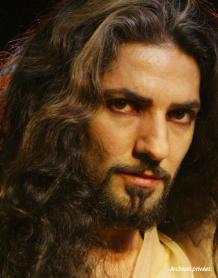Shahrokh Moshkin Ghalam, Dancer, choreographer, actor

Shahrokh Moshkin Ghalam est né à Téhéran dans une famille aisée. Son père, militaire de carrière engagé aux côtés de Chapour Bakhtiar, longtemps opposant au Shah, et nommé par lui Premier ministre pour tenter de concilier les oppositions, est détenu pendant trois ans et torturé. La famille est menacée, notamment Shahrokh Moshkin Ghalam et ses trois frères qui militent après leur père pour le Mouvement de résistance nationale de l'Iran dirigé depuis son exil par Chapour Bakhtiar. Ils s’exilent finalement et se voient reconnaître la qualité de réfugié par l’Ofpra à la fin des années 80.
Installé en France, Shahrokh Moshkin Ghalam s’immerge dans la culture occidentale, et s’oriente vers la littérature et le théâtre. Il passe une licence d'histoire de l'art et du théâtre à l’université de Paris VIII. En 1991, il rejoint le Théâtre du soleil et sous la direction d'Ariane Mnouchkine obtient les rôles principaux dans Tartuffe, La Ville Parjure et Les Atrides. Il entre à la Comédie française en 1998 et y est nommé pensionnaire en 2005.
Il s’intéresse ensuite à la littérature puis à la danse persane, qui ne peut évoluer du fait des interdictions de la République islamique. Il part donc à la recherche des sources existantes. Il consulte des textes anciens restants, des réflexions de voyageurs étrangers sur l’art ancien de la Perse, étudie les miniatures, voyage autour de l’Iran pour retrouver des traces de ces danses qui ont exercé une influence en Turquie, dans le Caucase, en Irak, en Afghanistan, jusque en Inde où le Kathakali, inspiré en partie par la danse persane, a engendré le flamenco.
Shahrokh Moshkin Ghalam se spécialise dès lors dans les danses folkloriques et mystiques du Moyen-Orient et se passionne pour les danses indiennes, indonésiennes et le flamenco. En 1997, il crée la compagnie Nakissa, et produit notamment Les Songes d'une nuit Persane, Omar Khayam, Les Danses Mythologiques, et en création : Hafez. Se consacrant entièrement à la danse il quitte la Comédie Française en 2011.